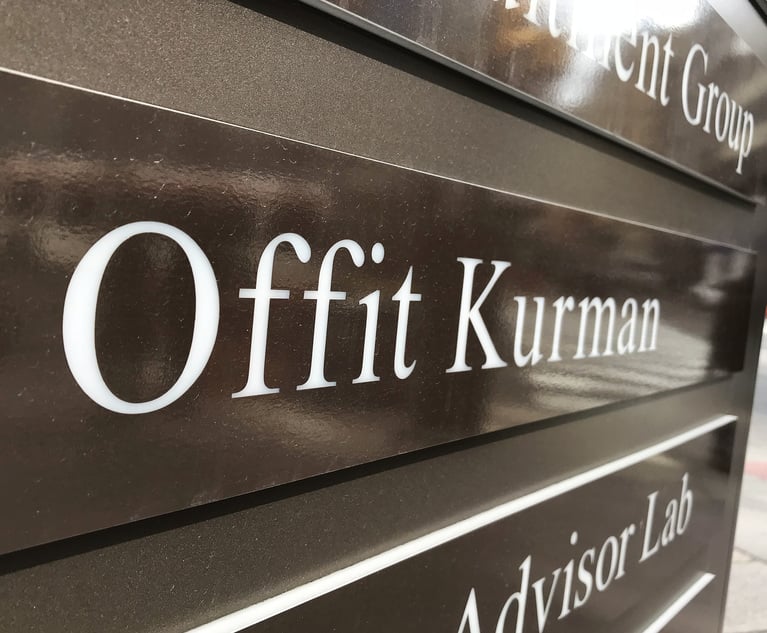 Rachel M. Good of Duane Morris. Courtesy photo
Rachel M. Good of Duane Morris. Courtesy photo District Court Not Authorized to Compel a Resident to Produce Discovery Abroad
For the purposes of Section 1782(a), a district court may only assist in discovery "for use in a proceeding in a foreign or international tribunal," and the "private" arbitral panels governing the subject arbitrations did not qualify as that type of "tribunal" because they had derived no authority from a "governmental adjudicative body."
September 20, 2022 at 11:07 AM
6 minute read
Recently, in ZF Automotive US v. Luxshare, 596 U.S. __, 142 S.Ct. 2078 (2022), the U.S. Supreme Court decided two consolidated cases in which international parties, who were engaged in private arbitration, had moved federal district courts to enforce discovery orders against third parties residing in the United States. The court unanimously held that under 28 U.S.C. Section 1782(a), a federal district court is not authorized to compel a resident within the court's jurisdiction to testify or produce documentation for use in a private arbitration abroad. See ZF Automotive, 142 S.Ct. at 2089. For the purposes of Section 1782(a), a district court may only assist in discovery "for use in a proceeding in a foreign or international tribunal," and the "private" arbitral panels governing the subject arbitrations did not qualify as that type of "tribunal" because they had derived no authority from a "governmental adjudicative body."
The holding of ZF Automotive will have a significant impact on the ability of international parties engaged in private arbitration to obtain evidence from third parties in the United States. According to the opinion, this is both an efficient and equitable outcome because it puts Section 1782(a) more in line with the Federal Arbitration Act, 9 U.S.C. Section 1 et seq. (FAA), which allows an "arbitration panel" to request discovery in domestic arbitrations across state lines. Worded more broadly than its domestic counterpart, Section 1782(a) permits federal district courts to entertain a discovery request from not only "a foreign or international tribunal," but also "any interested person." After reviewing the legislative history and policy rationale of both the FAA and Section 1782(a), the Supreme Court reasoned that Congress would have never intended to "lend the resources of district courts to aid in purely private bodies adjudicating purely private disputes abroad." This was especially so because the purpose of Section 1782(a) was to encourage "reciprocal assistance" between "international governmental bodies."
This content has been archived. It is available through our partners, LexisNexis® and Bloomberg Law.
To view this content, please continue to their sites.
Not a Lexis Subscriber?
Subscribe Now
Not a Bloomberg Law Subscriber?
Subscribe Now
NOT FOR REPRINT
© 2025 ALM Global, LLC, All Rights Reserved. Request academic re-use from www.copyright.com. All other uses, submit a request to [email protected]. For more information visit Asset & Logo Licensing.
You Might Like
View All
Faegre Drinker Picks Arizona for Next-Gen Design Lab

Transfer of State-Law Claims From Federal to State Court in Pa.: Avoiding the Default Trap of 42 Pa. C.S. Section 5103
12 minute read
Offit Kurman Hit With $4M Legal Mal Judgment Over Client's Multimillion-Dollar Loss
3 minute read
Competitor Financed Litigation, Abused Discovery to Steal Trade Secrets, Lawsuit Filed by Sidley Austin Alleges
Law Firms Mentioned
Trending Stories
- 1'It's Not Going to Be Pretty': PayPal, Capital One Face Novel Class Actions Over 'Poaching' Commissions Owed Influencers
- 211th Circuit Rejects Trump's Emergency Request as DOJ Prepares to Release Special Counsel's Final Report
- 3Supreme Court Takes Up Challenge to ACA Task Force
- 4'Tragedy of Unspeakable Proportions:' Could Edison, DWP, Face Lawsuits Over LA Wildfires?
- 5Meta Pulls Plug on DEI Programs
Who Got The Work
Michael G. Bongiorno, Andrew Scott Dulberg and Elizabeth E. Driscoll from Wilmer Cutler Pickering Hale and Dorr have stepped in to represent Symbotic Inc., an A.I.-enabled technology platform that focuses on increasing supply chain efficiency, and other defendants in a pending shareholder derivative lawsuit. The case, filed Oct. 2 in Massachusetts District Court by the Brown Law Firm on behalf of Stephen Austen, accuses certain officers and directors of misleading investors in regard to Symbotic's potential for margin growth by failing to disclose that the company was not equipped to timely deploy its systems or manage expenses through project delays. The case, assigned to U.S. District Judge Nathaniel M. Gorton, is 1:24-cv-12522, Austen v. Cohen et al.
Who Got The Work
Edmund Polubinski and Marie Killmond of Davis Polk & Wardwell have entered appearances for data platform software development company MongoDB and other defendants in a pending shareholder derivative lawsuit. The action, filed Oct. 7 in New York Southern District Court by the Brown Law Firm, accuses the company's directors and/or officers of falsely expressing confidence in the company’s restructuring of its sales incentive plan and downplaying the severity of decreases in its upfront commitments. The case is 1:24-cv-07594, Roy v. Ittycheria et al.
Who Got The Work
Amy O. Bruchs and Kurt F. Ellison of Michael Best & Friedrich have entered appearances for Epic Systems Corp. in a pending employment discrimination lawsuit. The suit was filed Sept. 7 in Wisconsin Western District Court by Levine Eisberner LLC and Siri & Glimstad on behalf of a project manager who claims that he was wrongfully terminated after applying for a religious exemption to the defendant's COVID-19 vaccine mandate. The case, assigned to U.S. Magistrate Judge Anita Marie Boor, is 3:24-cv-00630, Secker, Nathan v. Epic Systems Corporation.
Who Got The Work
David X. Sullivan, Thomas J. Finn and Gregory A. Hall from McCarter & English have entered appearances for Sunrun Installation Services in a pending civil rights lawsuit. The complaint was filed Sept. 4 in Connecticut District Court by attorney Robert M. Berke on behalf of former employee George Edward Steins, who was arrested and charged with employing an unregistered home improvement salesperson. The complaint alleges that had Sunrun informed the Connecticut Department of Consumer Protection that the plaintiff's employment had ended in 2017 and that he no longer held Sunrun's home improvement contractor license, he would not have been hit with charges, which were dismissed in May 2024. The case, assigned to U.S. District Judge Jeffrey A. Meyer, is 3:24-cv-01423, Steins v. Sunrun, Inc. et al.
Who Got The Work
Greenberg Traurig shareholder Joshua L. Raskin has entered an appearance for boohoo.com UK Ltd. in a pending patent infringement lawsuit. The suit, filed Sept. 3 in Texas Eastern District Court by Rozier Hardt McDonough on behalf of Alto Dynamics, asserts five patents related to an online shopping platform. The case, assigned to U.S. District Judge Rodney Gilstrap, is 2:24-cv-00719, Alto Dynamics, LLC v. boohoo.com UK Limited.
Featured Firms
Law Offices of Gary Martin Hays & Associates, P.C.
(470) 294-1674
Law Offices of Mark E. Salomone
(857) 444-6468
Smith & Hassler
(713) 739-1250





